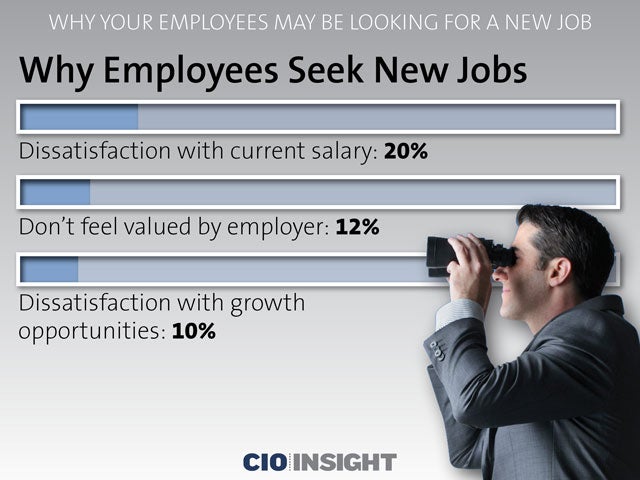
Why Your Employees May Be Looking for a New Job
 Why Your Employees May Be Looking for a New Job
Why Your Employees May Be Looking for a New Job
Salary dissatisfaction and feelings of being underappreciated are causing many employees to seek new jobs. Find out how to avoid a talent exodus in your staff.
 Exploring Options
Exploring Options
25% of the employees surveyed said they plan to look for a new job during the next three months, and 35% intend to look for a new job over the next year.
 Why Employees Seek New Jobs
Why Employees Seek New Jobs
Dissatisfaction with current salary: 20%,
Don’t feel valued by employer: 12%,
Dissatisfaction with growth opportunities: 10%
 Most Prized Benefits for Long-Term Future
Most Prized Benefits for Long-Term Future
Flex-time: 25%,
Performance bonuses: 21%,
Telecommuting: 20%
 Here Today …
Here Today …
52% of the workers surveyed said they are confident that their current primary job will still exist in 2037, although 17% admitted that the primary job they held in 1997 no longer exists.
 Team Tethered
Team Tethered
42% said they hesitate to take earned vacation time because they’re afraid of disrupting their team’s workflow, and 30% said they feel guilty when requesting vacation time.
 Budget Strapped
Budget Strapped
62% of the HR managers surveyed said their organization recognizes the need to pay higher wages to stay competitive, but it simply can’t afford to do so at this time.
 Competing Interest
Competing Interest
74% said their competitors are raising wages to attract top talent.
 Tech Demand
Tech Demand
59% of the HR managers said it is difficult to find qualified science, technology, engineering and mathematics (STEM) pros, up from 51% who said this last year.
 Elusive Education, Part I
Elusive Education, Part I
62% said their company struggles to keep up with evolving training demands so that workers’ skills stay up to date, up from 48% who said this in 2016.
 Elusive Education, Part II
Elusive Education, Part II
62% of the HR managers said it is difficult to keep up with the costs of training workers for future skills needs, up from 48% who said this last year.
 Generational Issue
Generational Issue
57% of the HR managers surveyed said their organization finds it challenging to recruit and hire Millennials, up from 50% who said this in 2016.